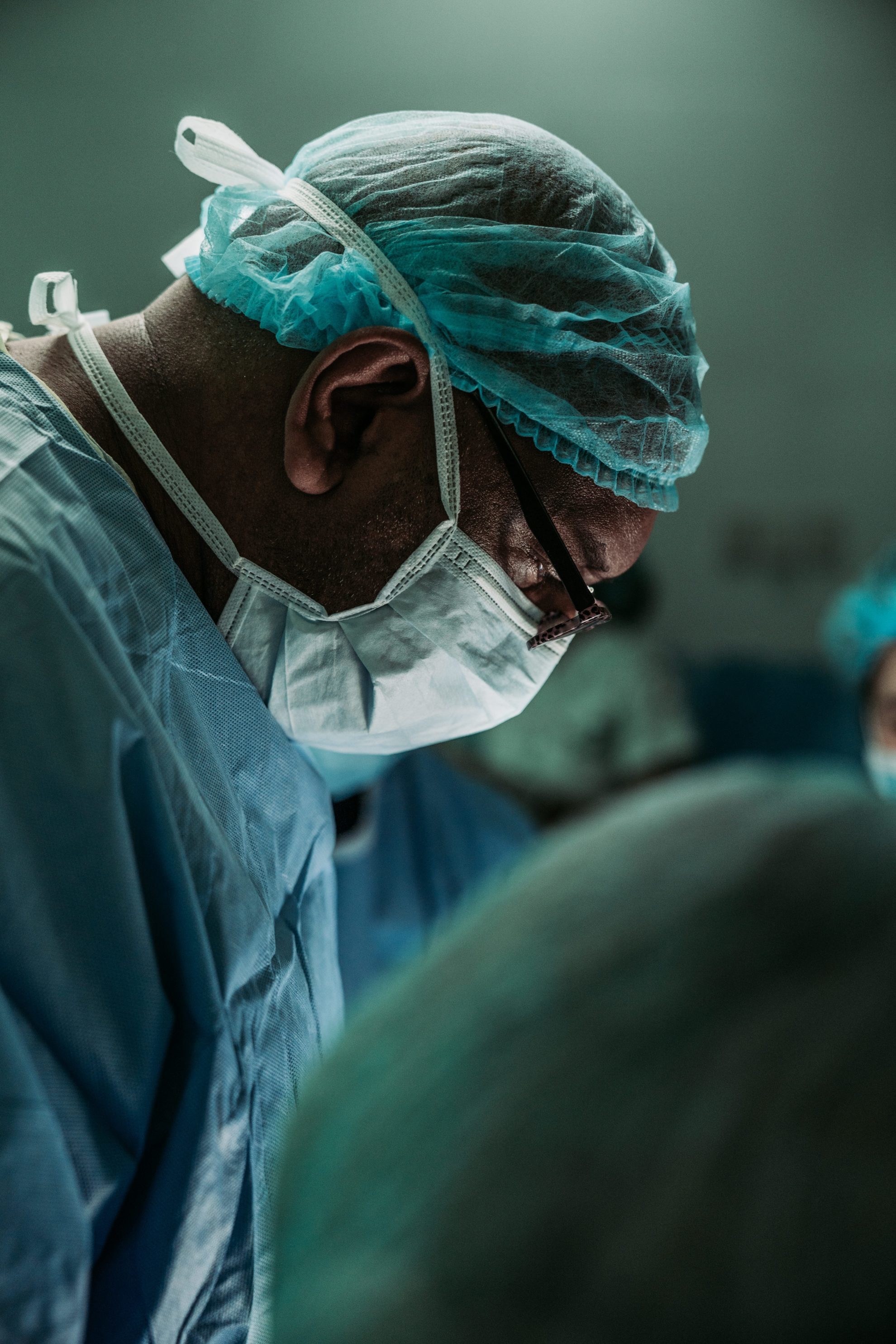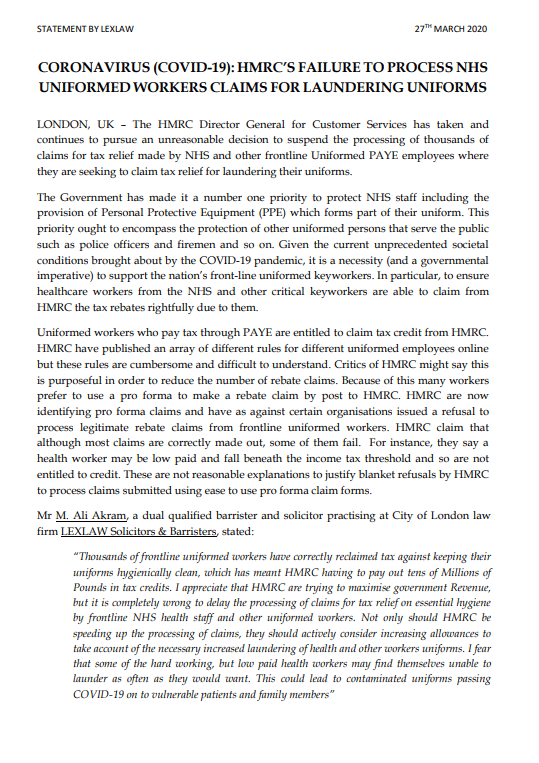CORONAVIRUS (COVID-19): HMRC’S FAILURE TO PROCESS NHS UNIFORMED WORKERS CLAIMS FOR LAUNDERING UNIFORMS
LONDON, UK – The HMRC Director General for Customer Services has taken and continues to pursue an unreasonable decision to suspend the processing of thousands of claims for tax relief made by NHS and other frontline Uniformed PAYE employees where they are seeking to claim tax relief for laundering their uniforms.
The Government has made it a number one priority to protect NHS staff including the provision of Personal Protective Equipment (PPE) which forms part of their uniform. This priority ought to encompass the protection of other uniformed persons that serve the public such as police officers and firemen and so on. Given the current unprecedented societal conditions brought about by the COVID-19 pandemic, it is a necessity (and a governmental imperative) to support the nation’s front-line uniformed keyworkers. In particular, to ensure healthcare workers from the NHS and other critical keyworkers are able to claim from HMRC the tax rebates rightfully due to them.
Uniformed workers who pay tax through PAYE are entitled to claim tax credit from HMRC. HMRC have published an array of different rules for different uniformed employees online but these rules are cumbersome and difficult to understand. Critics of HMRC might say this is purposeful in order to reduce the number of rebate claims. Because of this many workers prefer to use a pro forma to make a rebate claim by post to HMRC. HMRC are now identifying pro forma claims and have as against certain organisations issued a refusal to process legitimate rebate claims from frontline uniformed workers. HMRC claim that although most claims are correctly made out, some of them fail. For instance, they say a health worker may be low paid and fall beneath the income tax threshold and so are not entitled to credit. These are not reasonable explanations to justify blanket refusals by HMRC to process claims submitted using ease to use pro forma claim forms.
Mr M. Ali Akram, a dual qualified barrister and solicitor practising at City of London law firm LEXLAW Solicitors & Barristers, stated:
“Thousands of frontline uniformed workers have correctly reclaimed tax against keeping their uniforms hygienically clean, which has meant HMRC having to pay out tens of Millions of Pounds in tax credits. I appreciate that HMRC are trying to maximise government Revenue, but it is completely wrong to delay the processing of claims for tax relief on essential hygiene by frontline NHS health staff and other uniformed workers. Not only should HMRC be speeding up the processing of claims, they should actively consider increasing allowances to take account of the necessary increased laundering of health and other workers uniforms. I fear that some of the hard working, but low paid health workers may find themselves unable to launder as often as they would want. This could lead to contaminated uniforms passing COVID-19 on to vulnerable patients and family members”
LEXLAW has written directly to Ms Angela MacDonald, the relevant Director General at HMRC (copied to the Prime Minister, Boris Johnson) lobbying to seek that she reconsider her draconian policy decision, and in particular has requested that:
- HMRC should not be refusing to process any claims for tax relief on laundering and, in fact, the tax allowance should be significantly increased to take account of the increased and critical need for cleanliness promulgated by the COVID-19 threat to the UK.
- HMRC should be publicising the fact that tax relief for cleaning and laundering uniform is available to PAYE employees in particular to NHS staff and other uniformed keyworkers who continue to serve the UK for the greater good.
- Laundering is a critical service which ought properly to be maintained and that this service be immediately zero rated for the purposes of VAT in the wider public interest, such zero rating to include the cost of collection and delivery as appropriate.
- Low paid uniformed workers should be paid an equivalent to the tax relief they would have been given to reimburse them for laundry and cleaning costs.
Mr M. Ali Akram further stated:
“It is surely wrong to penalise low paid health workers who are putting their lives at risk for the greater good. A lot of retired health workers have come back to aid the nation in this time of global crisis. Because their employment may be short, they may fall below the income tax threshold. Some workers may have to take unpaid leave to care for others. I believe the right thing to do is for us to support the NHS and its workers. Credit for the basic hygiene of uniforms should be given to all and not just those who are higher earners”
LEXLAW acts for taxpayers against HMRC and are instructed in ongoing judicial review permission proceedings against HMRC’s unreasonable decision to refuse to process proforma claims. Affected taxpayers include front line keyworkers such as NHS healthcare workers, nurses, midwives, paramedics and any other uniformed workers.
Mr Karim Oualnan, a solicitor and partner at City of London law firm LEXLAW Solicitors & Barristers with conduct of the judicial review proceedings against HMRC stated:
“NHS staff have already reportedly suffered enough through the state’s lack of provision of Personal Protective Equipment (PPE). Exposing NHS health workers and other uniformed frontline workers to unwarranted and unnecessary financial concerns at this difficult time is wrong. It will also be a disaster in terms of the aim for reduction of the spread of the coronavirus if some workers have to cut back on laundering their uniforms particularly given the unprecedented COVID-19 pandemic because of the Director General, Ms MacDonald’s unreasonable decision to stop HMRC from processing legitimate rebate claims which is contrary to HMRC’s obligations under the Taxpayer’s Charter. I trust that common sense and fairness will prevail within HMRC and that they will choose to give our essential uniformed keyworkers support at this critical and unprecedented time.”
HMRC’s unreasonable policy decision is antithetical to the national policy. On the one hand, the government urges the nation to protect the NHS but on the other hand HMRC’s draconian policy decision does not protect the personal finances of key NHS workers during a time of economic uncertainty. To that end we have instructed specialist Tax Counsel who will advocate on behalf of frontline keyworkers at the earliest opportunity.
The public interest would be best served by an immediate processing of all outstanding claims without HMRC imposing arbitrary criteria the breach of which will inevitably lead to HMRC not processing any claims from a significant portion of uniformed workers in the UK including frontline NHS staff and other keyworkers protecting our communities.
Summary:
- A HMRC Commissioner on the executive committee, has taken a draconian policy decision to suspend the processing of thousands of claims for tax relief made by NHS and other frontline uniformed PAYE employees such as the police and fire services where they are trying to claim tax relief for laundering their work uniforms.
- HMRC are trying to maximise government revenue, but it is completely wrong to issue a blanket refusal to the processing of claims for tax relief on essential hygiene by key frontline health and other uniformed workers particularly given the COVID-19 pandemic.
- The Government has made it the number one priority to protect the NHS particularly given the COVID-19 pandemic however HMRC have taken the policy decision not to reimburse NHS workers for laundering their uniforms.
- HMRC is exposing key health workers and other uniformed frontline workers to unwarranted and unnecessary financial concerns at this difficult time not least given the national coronavirus (COVID-19) pandemic when laundering of healthcare unfirms is vital to slow the spread of the disease and save lives.
Contact details for editors:
- LEXLAW is a unique law firm that partners solicitors and barristers and is the only law firm based in the Middle Temple (an Inn of Court). The Tax Disputes team has years of experience in challenging decisions against HMRC and handling tax appeals at the Tax Tribunals and in the High Court in contentious tax dispute cases.
- Andrew Young, Barrister of Prince Henry’s Chambers, is counsel in Judicial Review proceedings against HMRC. Andrew is a former Principal Revenue Lawyer and has headed Tax Litigation practices at Deloitte and PWC.

